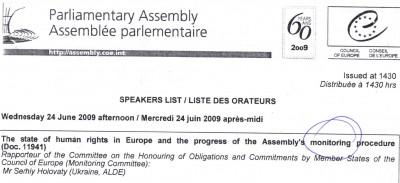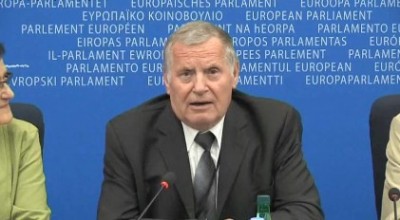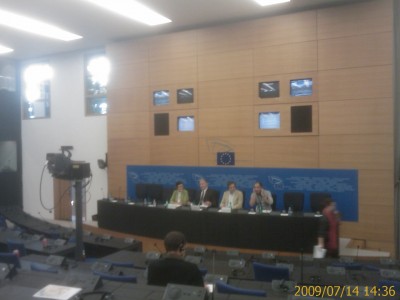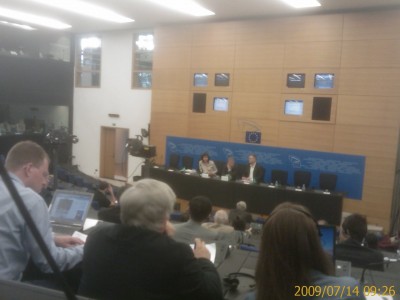 newsitems
newsitems  Ankara rejects CoE criticism for grave Human Rights Violations during EU-Turkey talks 2004-2009
Ankara rejects CoE criticism for grave Human Rights Violations during EU-Turkey talks 2004-2009
Ankara rejects CoE criticism for grave Human Rights Violations during EU-Turkey talks 2004-2009

Turkey was alone among CoE's 47 Member States to officially reject CoE Assembly's criticism for grave Human Rights violations, when 2 landmark Reports on "Ending Impunity" and the 1st "Monitoring" check since EU decided controversial negotiations with Ankara (2004-2009), were discussed this week in Strasbourg.
CoE's Reports generally denounced that "the most serious cases" of Human Rights Violattons "involve wide-spread abuses committed by security forces in conflict situations", such as "in Northern Ireland (i.e. by the UK), south-eastern (predominantly Kurdish) Turkey, and the Chechen republic of the Russian federation", according to a Resolution drafted by German Socialist MEP Herta Daubler-Gmelin. and extended criticism to many other new or old CoE's member States.
Nevertheless, it was only Ankara who formally reacted : The Turkish National Delegation circulated an official Document claiming that CoE Monitoring Report's "criticism" would be "unfair", "exagerated", etc.

Drafted by the experienced President of CoE's Monitoring Committee, former Justice Minister, Ukranian MEP Serge Holovaty, the 2009 bi-annual Report on the fulfillment of member State's obligations on Human Rights, Democracy and Rule of Law, is a comprehensive overview describing main Facts in a long text of almost 100 pages (with the attached docs), which was adopted by CoE Assembly's Plenary with a strong Majority of 70 votes against only 20.
It observes that, recently, "CoE seriously considered the possibiliy of Re-Opening the Monitoring Process for Turkey", "if necessary" : A move which might provoke a "suspension" of EU - Turkey Negotiations, since it would put into doubt the respect of EU's "Copenhagen Criteria" . Indeed, EU had decided to open negotiations with Turkey only after CoE had "closed" its initial Monitoring process back in 2004.
- "Turkey ... is notorious for many Dissolutions of Political Parties", which are the main issue of "restrictions on Freedom of Association", notes Holovaty. "The most recent instances being the attempt to dissolve the ruling AKP party in 2008 and the political Crisis that ensued, as well as the on-going proceedings for the closure of the DTP party (pro-Kurdish)".
"The 2008 Crisis gave rise to a CoE Assembly debate under Urgent procedure on “the functioning of Democratic institutions in Turkey” ..and ..to the adoption of (a) Resolution. ...In almost all cases concerning the Dissolution of political Parties between 1991 and 1997, ECHR had concluded that the sanction was ..a Violation of the right to freedom of association. ...the recent cases involving the closing down of the AKP and the DTP illustrated the fact that the legislation currently in force does not provide politicians with sufficient protection against state interference in their freedom of Association and Expression. In 2008, the Assembly invited....to...closely follow the development of democratic functioning of state institutions" in Turkey.
- On Torture, there is "an obvious Contradiction between the (Turkish) Government’s stated “zero tolerance” policy" against "Torture and other forms of ill-treatment, and the different testimonies given", denounces CoE's Rapporteur. Therefore, "I have urged the national authorities ..to guarantee that proper Investigations are carried out into allegations of abuses by members of the security forces and that perpetrators are effectively punished", he reveals.
- A "4rth Interim Resolution (was) adopted in 2008 by (CoE's) Committee of Ministers on the Execution of Judgments of the ECHR by Turkey, ... and outstanding issues regarding the Court’s 175 judgments and decisions relating to Turkey delivered between 1996 and 2008, which mainly concern Deaths resulting from the Excessive use of Force by members of the Security forces, the Failure to protect the Right to Life, the Disappearance and/or Death of individuals, ill-treatment/Torture and the Destruction of property".
Moreover, "NGO representatives reported several cases of Violence committed last year (2008) by the Security forces" in Turkey. "Amnesty International and Human Rights Watch speak of many cases of Excessive use of force, ill-treatment, and Torture in the Prisons and by the Police", even today (2009).
F.ex., "in June 2008", Turkey "extended Police officers’ rights to resort to Lethal force and authorising them to Fire on any suspect who ignores a warning to stop" !
- " In Turkey, 2008 has reportedly been a Troublesome year with regard to Freedom of Expression. Amnesty International believes that freedom of expression is NOT guaranteed given the various articles of the Criminal Code that restrict it. For example, 1,300 Websites are said to have been closed down by the authorities in 2008" !....
"CoE is currently supervising the measures ...by the Turkish authorities in the execution of 82 judgments of the ECHR ..concerning Freedom of Expression" Violations. "The applicants' right ...had been violated as a result of ..conviction ..following the Publication of articles, drawings, or books... The other legal provisions restricting freedom of expression, such as Articles 215, 216, and 217 of the Turkish Criminal Code, remain Problematic ...and are used,...in proceedings against individuals who express their opinions on the Kurdish issues in a non-violent way, with judges and prosecutors adopting a broad interpretation of the provision on “incitement to violence” or “public interest”, CoE's Rapporteur denounced.
- " During my visit to Turkey in November 2008 ..I expressed ..Concerns with respect to the Independence of the Judiciary, in particular as regards the influence of the Minister of Justice on the High Council of Judges and ..Prosecutors, ..responsible for their selection, appointment, and transfer ..and for disciplinary measures against them. ..The influence of the Ministry ..on this body is ..structural..: The Minister ..is its president and sets its agenda; its offices and those of the Ministry ..adjoin one another, its budget is controlled by the ministry and it does not have its own secretariat. Moreover, (it) answers directly to the Ministry.. I was also surprised to learn that (it) cannot initiate the prosecution of a judge or prosecutor without the consent of the Minister.. I find it hard to see how (it) can operate independently of the Ministry... under these circumstances", denounces Holovaty.
- "When closing the Monitoring Procedure ... with Turkey, the Assembly, in its Resolution of 2004, called on the Turkish authorities to “...recognise the existence of national Minorities living in Turkey and grant the persons belonging to these minorities the right to maintain, develop and express their Identity and to apply it in practice", reminded CoE's Rapporteur. But, "during my visit to Turkey in November 2008 ...the Turkish authorities did not provide any new information on this" !
"However, the issue of cultural minorities, especially the Kurds, remains an important one. During my discussions with representatives of the DTP... group., they voiced their Regret that the rights of the Kurds did not form part of the Turkish identity even though they numbered 20 Million People. In their opinion, the 10% threshold was introduced to prevent Kurdish representation in parliament, and the current legal action against the DTP was just one of many attempts to limit the expression of their political views. ..they fear the Constitutional Court will order the party to be closed down, as it has already done on several occasions in the past. ."
Even "the representatives of the Jewish community ...expressed their Concern at the rise in Anti-Semitism and the various acts of Vandalism against their community. They expressed their regret that the Hate speech put out by Extremist media, ...went unpunished. ...Anti-Semitic acts reportedly go unpunished ...The various community representatives I met confirmed that there is a strong tendency in the Turkish press landscape towards Extremist Nationalist and overtly Hostile positions towards Minorities, whether Religious or Not", CoE's 2009 Rapporteurt reveals.
- " I met members of the Religious Minorities in Turkey who ...emphasised the Problem that they do not have legal Personality, and that this has direct consequences in terms of Property rights and.. management. In my interview with ...His Holiness the Ecumenical Patriarch Bartholomew I, also mentioned the difficulties encountered, particularly with respect to his “Ecumenical” title and ...the issue of the Closure of the Greek Orthodox theological College in Heybeliada (Halki seminary)..
In consequence, "the Monitoring Committee asked the Venice Commission (CoE's independent Legal Experts) to assess the compatibility with European standards of the lack of recognition of legal personality for the religious communities in Turkey and examine, in this context, the question of the right of the Greek Orthodox Patriarchate of Istanbul to use the adjective “Ecumenical”.
- "I also met the President of the Alevi-Bektashi Foundation. Alevism, as one of the branches of Islam, is the second most important religious belief in Turkey after Sunnism, and has between 15 and 20 million believers, equivalent to 33% of the Turkish population. As the Alevis do not recognise Mosques as places of worship ..., they are calling for recognition of their faith and, especially, the abolition of compulsory (Sunni) religion classes, the abolition of the Religious Affairs Directorate, which functions as the state’s religious body even though the state is constitutionally secular, and the statutory recognition of their place of worship, the “Cem houses”. They have also asked the authorities to allow them to turn a hotel in Sivas, where 33 Alevis died in a tragic arson attack in 1993, into a museum".
. On "the obligation of the Turkish authorities to “[…] recognise the right of Conscientious Objection and establish an Alternative civilian service” ..;Regrettably, the legislation in this area has not yet been amended to this effect. In a recent case, Ülke v. TurkeY, the Court concluded that the many ..Prison sentences imposed on the applicant for refusing to do his military service constituted Degrading treatment.... The Court held that the existing legal framework was insufficient as ...the only rule ..seemed to ..provide for punishments in general terms for disobeying the orders of a superior... The Committee of Ministers urged the Turkish authorities to take without further delay all necessary measures to put an end to the violation of the applicant’s rights ..and to adopt rapidly the legislative reform necessary to prevent similar violations... On 19 March 2009, the Committee of Ministers adopted a 2nd Interim Resolution on the Ülke v. Turkey case. . However, ..the applicant continues to be imprisoned ...Moreover, conscientious objectors continue to be prosecuted and frequent allegations of their ill-treatment in prison are reported. Furthermore, public Statements calling for the Right to conscientious objection, have led to convictions" in Turkish jails.
-----------------------
In reply, Turkish MEPs claimed that CoE's "criticism is Unfair", particularly "on Freedom of Expression", because, according to them, "similar provisions exist in ... European Countries as well"...
However, (and among many other -and more grave- examples), they did not explain how it became possible for ... "1,300 Websites ...to have been closed down by the (Turkish) authorities in 2008" ! (See above).
Turkish MEPs also admit that the anti-Democratic, restrictive "10% Threshhold at National Elections" was introduced in Turkey after the Military Regime of the 1980ies, but this was done by the Military in order to impose, "during the period 1983 to 2006" a "political Stability", as they claim.
But the paper of the Turkish Delegation had nothing to oppose to CoE's criticism on Torture and inhuman or degrading treatments in Turkey (See above)...
-----------------------------
Professor Casesse : Create an independent European Commission of Enquiry
----------------------------------------
In front of Turkey's and others' reluctance, the experienced former President of the International criminal Court for the former Yugoslavia, and new President of the Special Tribunal for Lebanon, Professor Casesse, found only one practical solution :
- He proposed the creation of a special and independent CoE's body able to launch efficient and independent Investigations in cases of Grave Violations of Human Rights in its 47 Member States, (going beyond what CoE's anti-Torture watchdog, CPT already does), at the request of a State or of the individual Victims of grave violations.
By "establishing a European Commission of Inquiry", "made up of Independent Experts", "capable of being activated either by the Victims or by States concerned', and having "a broad scope", on "Fact finding relating to any Gross and Systemic Violation of Human Rights", with the "right to disclose its findings whenever the State in question contumaciously failed to comply with its conclusions".
CoE's "Assembly considers the Fight against Impunity of Perpetrators of Serious Human Rights Violations as a PRIORITY for the CoE, and all National and International law-enforcement bodies", stressed another Resolution adopted this week in Strasbourg.
- "Impunity must be eradicated, both as a manner of Indiividual Justice, and as a Deterrent with respect to Future Human Rights Violations", CoE's Resolution points out.
=> In Conclusion, CoE's Resolutions "invite the EU ..., to make use of the Reports ...and take into account the findings of the relevant CoE Human Rights Monitoring mechanisms".
The next EU appraisal on whether Turkey made progress, or not, in he fulfilment of its obligations, including on Human Rights, is scheduled for Autumn 2009, with final decisions on December 2009.
But, meanwhile, EU Parliament has also to discuss and vote, since September 2009, the ammount and the conditions for the total or partial continuation, or not, of the Annual EU Budget's Funds for Turkey's presumed "efforts" to comply with all EU criteria..
Main Menu
Home Press Deontology/Ethics 2009 Innovation Year EU endorses EuroFora's idea Multi-Lingual FORUM Subscribers/Donors FAQs Advanced search EuroFora supports Seabird newsitems In Brief European Headquarters' MAPs CoE Journalists Protection PlatformBRIEF NEWS
- 00:00 - 02.06.2021
- 00:00 - 18.10.2020
- 00:00 - 19.06.2020
- 00:00 - 18.05.2020
- 00:00 - 20.04.2020
- 00:00 - 02.02.2020
- 00:00 - 09.12.2019
- 00:00 - 27.11.2019
- 00:00 - 16.11.2019
Popular
- Yes, we could have prevented Ferguson riots says World Democracy Forum's Young American NGO to ERFRA
- Spanish People Elect CenterRIGHT Majority with 1st Party and Total of 178 MPs (6 More than the Left)
- Pflimlin's vision
- The European Athletic "Dream Team", after Barcelona 2010 Sport Championship Results
- Source Conseil d'Europe à ERFRA: Debatre Liberté d'Opposants à Loi livrant Mariage+Enfants à Homos ?
- Head of BioEthics InterGroup, MEP Peter Liese : "Embryonic stem cell research reaching its END" !?
- Spain: Jailed Turkish Terror suspect with Explosive,Drones,Chechen accomplices stirs Merah+ Burgas ?
- UN Head Ban Ki Moon at CoE World Democracy Forum : - "Listen to the People !"
Latest News
- EUOmbudsmen Conference 2022: Digital Gaps affect People's Trust threaten EF Project on EU Future ?
- French Election : Black Out on Virus, but Obligation for Fake 'Vaccines" Challenged
- Both French Presidential Candidates point at "Humanism" in crucial times...
- France : Zemmour = Outsider may become Game Changer in Presidential + Parliamentary Elections 2022
- PACE President Cox skips Turkey Worst (Occupation) case compared to Russia (DeMilitarisation) query
Statistics
Visitors: 59711179Archive
Login Form
Other Menu

Former "Green-Red" German government's Foreign Minister Joschka Fischer's job at the controversial Turkish pipeline "Nabucco" was denounced as "not proper", "very bad", and "incompatible with Democracy", by the new President of EU Parliament's EuroLeft Group, German Lothar Bisky, replying to an "EuroFora" question.
For once, criticism of Joschka Fischer's doings with Turkey affecting Europe, didn't come only from the Center-Right of the political spectrum, but even from his Left side : The experienced Bisky, who has been chairing all over 1993-2009 the PDS - Die Linke party :
- "Former Foreign Minister Joschka Fischer got involved in dealings with oil-gaz business in a foreign country, Turkey, and its controversial Nabucco pipeline. This raises questions about Democracy, also because of the well known problems of Human Rights violations in that country. Do you thing that this might be abused in order to cover up and close EU's eyes on Human Rights violations ?", "EuroFora" asked Bisky.

- "Nabucco pipeline is (only) at the planning stage". And "there are some difficulties", he observed from the start. But "'I don't want to get into the details of Nabucco pipeline, because I don't think that there is any point for it at the moment".
At any case, "we (EU Parliament's EuroLeft Group) strongly believe that Politicians should not get involved in the Energy Business, and all these commercial transactions", President Bisky declared on the Joschka Fiischer's affair.
- "We feel that it's something that shouldn't be done. It's not proper !"
- "We don't think that it's compatible with Democracy either, and it gets politics into a very Bad track", Bisky went on to denounce.
- "EuroLeft and "Die Linke" always spoke against that, saying that politicians should not get directly into the arms of private enterprises"
- "It is pretty bad if a former Minister takes a job f.ex. in a major Energy producer. So, it's an issue if a Minister who may have seen excellent opportunities, subsequently gets personally grasp of them, in very serious parts of the economy, once he has given up his (Government) job."
- "It doesn't really make politics in general look any better'", Bisky concluded.

Earlier, this week in Strasbourg, other Journalists had also raised critical questions on former Foreign Minister Joschka Fischer's involvement in the conroversial Turkish Nabucco pipeline to the President of his own EuroParty : Kohn-Bendit of the "Greens", who, contrary to Bisky, tried to find excuses for Fischer, while criticizing his long-time partner, Schroeder for having done a similar move :
- "Shroeder was chancellor", and he "negociated" with "Russians", who gave him a job only "3 Months" after he resigned from the Government. While "Joschka Fischer", on the contrary, got a job with the controversial Turkish Nabucco pipeline only "4 Years after" he left the Government. "He didn't negociate Nabucco", so I have "no objection", Kohn Bendit claimed.
But, many Facts indicate the contrary :
Joschka Fischer was Foreign Minister in Germany from 1999 up to 2005 : I.e. from the year that EU took the controversial decision to give Turkey a "Candidate" status, until he year it started controversial "accession negotiations, (later declared "open-ended" after Sarkozy-Merkel's arrival from 2005-2007).
During that period was prepared the controversial so-called "Annan" Plan (in fact, drafted by others and attributed afterwards to the former UN SG) on Cyprus, which failed after a Popular Referendum said "No" on 2004 with a large Majoriy of 3/4 : 75%. Mainly because it was criticized for making too much concessions to the Turkish side : Particularly by restricting Greek Cypriot Refugees' Human Right to return to their ancestral Land and/or get restitution of their Familiy Homes and private properties, usurpated by Ankara's Army since the 1974 militay invasion and continuing occupation of the northern part of Cyprus. And by weakening the Central Government, leaving to 2 "constituent States" so much powers and separate interests that more conflicts appeared inevitable, provoking the danger of a break-down in the foreseable future, with more crisis, troubles, perhaps bloodshed, etc., instead of creating an harmoniously integrated, really one federal State.
The controversial Plan was finalized on March-April 2004 at Burgenstock (Switzerland), curiously in the presence of an Envoy by the Ministry of Foreign Affairs of Germany, then governed by Joschka Fischer, but in the absence of a French and not even an European Union's Envoy, contrary to what was usually practiced on similar occasions in Switzerland (fex. in 1997 at Montreux, in 2000 at Geneva, etc).
Turkey notoriously exploited the failure of the "Annan" Plan in order to convince the EU to decide to start accession Negotiations on December 2004. This provoked an unprecedented series of Institutional Crisis inside the EU, shortly afterwards, when French and Dutch People rejected, 2 popular EuroReferenda by a majority "'No" vote to the EU Constitutional Treaty on 2005, aggraveted in 2004 a Majority Abstention to EU Elections, etc., followed by the recent Irish "No", etc.
"Nabucco" Gas pipeline was notoriously planned since ..2002. It follows an even earlier idea, for an Oil pipeline Baku-Ceyhun, which started to be prepared on 1999-2001 and was meanwhile recently completed.
So, facts indicate that what is now at stake is based on decisions made during Joschka Fischer's term as former Foreign Minister, closely interested in Turkey's controversial EU-bid.
To the point that he now practically ...switched jobs with a poliician from Turkey, (the State which pays today openly Joschka Fischer), Mr. Ozdemir, who came earlier in Germany, got fast the nationality, and became EiuroMP in a few years, continuing now as head of the "Greens" in Germany, i.e. in Joschka's former job !...
Such astonishing facts risk, unfotunately, to give to German politician Lothar Bisky's criticism of representative Democracy a topical meaning :
- "We (EuroLeft Group) think that what is really at stake is Democracy. It's not only about Gas Pipelines or Energy sources", President Lothar Bisky went on to add in his reply to "EuroFora"'s question on Joscka Fischer's personal interests in the controversial Turkish "Nabuco" pipeline.
Such facts, "make People get more distance from Politics. ...People had had enough, and they are fed up !".
- "That's why we (EuroParliament's "EuroLeft" Group) want to strengthen Direct Democracy in Europe. Citizens should be involved in the (EU) Decision-making. In the end of the day, it's not going to help anyone if Politicians are always taking decisions, without involving Citizens. We want to give a voice to the People of Europe. They've got to have their say in the decisions that are taken. That's one of our absolutely fixed and steadfast views. We want more Direct Democracy in Europe. That's how it can become more effective and stronger", he concluded.
-


















